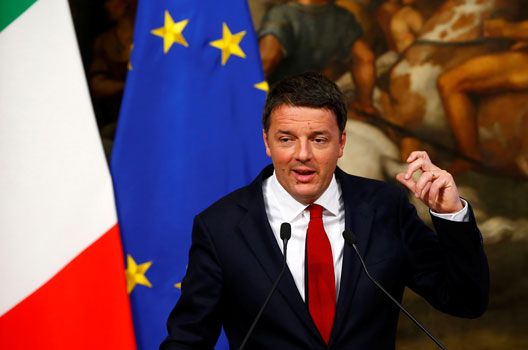 Italians will vote on constitutional reform in a referendum on December 4 that could shape the global perception of Italy and determine Prime Minister Matteo Renzi’s future.
Italians will vote on constitutional reform in a referendum on December 4 that could shape the global perception of Italy and determine Prime Minister Matteo Renzi’s future.
If it prevails, the reform would vest the power to pass laws solely in the lower house of parliament, instead of the current system that requires approval from the Senate as well. Renzi has campaigned for a “yes” vote and has said he will resign if it fails.
A “yes” vote would positively transform the legislative process in Italy and provide much-needed clarity on local governments’ powers, which were expanded in 2001. Italy’s Supreme Court has been inundated with questions on the national parliament’s right to make laws and whether it infringes on the job of local governments. Today, more than 40 percent of the cases before the Supreme Court are centered on this very question.
A “yes” vote could significantly improve the world’s perception of Italy and its political system. Italy will be seen as a country where reforms can materialize. This will boost investor confidence. Economic reforms will speed up with Renzi—now politically stronger and more confident with the people’s validation of his policies—as prime minister.
Political stability in Italy might also help Europe find its way. The Continent is at a critical juncture. Important elections are coming up within the next twelve months in Austria, the Netherlands, France, and Germany amid rising populism in the West. In such an unstable and uncertain world, Italy can be a critical anchor and provide a road map for Europe for the short as well as the long term.
Polls, however, indicate that the “no” vote might prevail, opening up to a number of alternative scenarios. Defeat by a narrow margin could mean that a new Renzi government will be put in place, or the current one will continue to serve, and no major institutional breakdown will occur. Defeat by a larger margin, however, would mean a caretaker government or early elections are more likely.
Italy has survived more dramatic events in the past. Consider, for example, the political transition from Silvio Berlusconi to Mario Monti in the aftermath of the sovereign debt crisis in late 2011 or even earlier the transition from Carlo Azeglio Ciampi—a technocrat called from the Bank of Italy to oversee the political system during the collapse of the previous regime, dominated for forty-five years by the Christian Democrats—to Berlusconi in May 1994.
A “no” vote on December 4 would mean bad news for the pace of reforms in Italy. The next prime minister will likely not have a strong parliamentary majority to push forward much-needed reforms that would go a long way toward making Italy more competitive.
Europe will suffer, too. A “no” vote will not just produce uncertainty in the short term. It would create an absence of strong leadership that would be crucial to putting forward a new vision of Europe to boost competitiveness and create more jobs and growth.
Andrea Montanino is the director of the Atlantic Council’s Global Business and Economics program. You can follow him on Twitter @MontaninoUSA.
Image: Italy's Prime Minister Matteo Renzi speaks during a news conference at the Chigi Palace in Rome November 28, 2016 . (Reuters/Tony Gentile)
